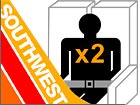
NEW YORK (CNN/Money) -
Long before Southwest Airlines said it would charge double the fare to anyone who can't fit in one seat, overweight people have faced a barrage of policies and procedures that have hit them in their wallets.
Studies have shown that obese people have been forced out of jobs, paid higher insurance premiums, or been denied medical coverage because of their weight. They often, too, earn lower wages and do not advance as far in higher education.
Now the airlines are taking their shots.
Southwest, a Dallas-based discount carrier, this week joined Continental and Northwest, in requiring large-sized passengers to pay for two seats.
"It definitely costs an overweight person more," said Morgan Downey, executive director of the American Obesity Association, an advocacy group based in Washington.
A delicate issue takes off
According to the obesity association, there is plenty of evidence that extra weight costs a person dearly. A recent study by Western Michigan University found that obese women earned 24 percent less in wages than other workers of standard weight. A 1988 follow up review of overweight children by Harvard School of Public Health showed that they had completed fewer years of school and were more likely to be living in poverty.
Yet another study by Yale University researchers found that obesity also can negatively influence adoption proceedings, jury selection and the housing process.
More recently, a 240-pound aerobics instructor was refused a job at dance-fitness giant Jazzersize, Inc. She later reached an agreement with the company to drop a requirement about the appearance of instructors. It was the first case settled under the city of San Francisco's "fat and short" law, which bans discrimination on the basis of weight and height.
Indeed, despite America's obsession with weight and dieting, the actual costs of obesity have gone unnoticed. Obese individuals, for example, spend 36 percent more on health care, and 21 percent more on medication, than smokers and heavy drinkers.
Defined by federal guidelines, obesity is determined by a person's body-mass index (BMI) -- a calculation that essentially boils down to height and weight. A BMI score of 30 or more is classified as obese, and a reading of 25 to 29.9 is overweight. A person who is 6 feet tall would be classified as obese if he or she weighed 221 pounds or more.
Southwest defends -- and explains -- its policy
Southwest, meanwhile, insists its policy protects the dignity, comfort and safety of obese passengers, said spokeswoman Christine Turneable-Connelly. The carrier, which said this week it will force overweight passengers to buy two seats, said it doesn't specify a weight, since people of different sizes may weigh the same. Rather, people will have to pay two fares if they need a seatbelt extension or can't fit within the armrests. The measurement between the two armrests is 17-1/4 inches, and the seat cushion spans 18-3/4 inches. Southwest has an explanation of the policy on its Web site where passengers can purchase tickets.
| |
 Related stories:
Related stories:
| |
| | |
| | |
|
The airline said the policy has been in effect since 1980. But it is formalizing the policy to coincide with a new ticketing process that takes effect June 26. (The tickets will say whether or not passengers have purchased two seats.)
Each ticketing agent who spots an overweight flyer will handle it as discreetly as possible, in his or her own way, Turneable-Connelly said. If the flyer bought the first fare at a discount, he'll get the second fare at the same price. If the flyer paid a last minute, premium price for the ticket, he can buy the second one at a reduced child's fare. The cost for a child's fare varies per route, she said.
Regardless of whether a flight is full, oversized customers will pay for two seats. But flyers can request a refund on the second fare if the flight isn't full. If the flight is full and two seats aren't available for a plus-sized traveler, the airline won't force him off the flight. Rather, the airline will ask for volunteers from the passengers aboard.
Continental, which also requires passengers who don't fit in the seat to buy an extra ticket, tells its ticketing agents to use their 'best judgment' when dealing with heavy flyers.
And at Northwest, obese fliers get reassigned to another flight if the plane is too full and does not allow for the purchase of a second ticket.

-- With additional reporting from Staff Writer Andrew Stein
|

